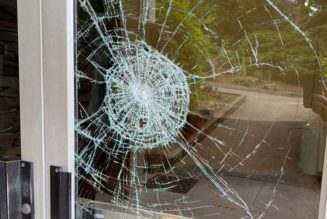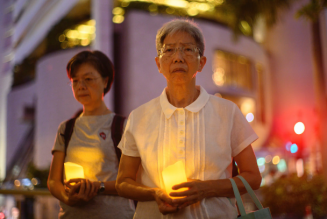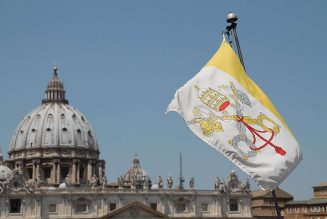SÃO PAULO – With 56 percent of the vote, ultra-libertarian economist Javier Milei was elected Argentina’s next president on Sunday, in a result that in some ways amounts to a referendum on the social and political agenda of Pope Francis in his home country.
Milei’s radical economic plans –for instance, adopting the U.S. dollar as the Argentinian currency – and his fierce rhetoric against social policies advanced by left-wing governments have been raising concerns among many in the South American country’s society, including the Catholic Church.
In his victory speech, president-elect Milei affirmed that the “end of the Argentinian decadence is beginning” and that “the impoverishing model of the omnipresent state that only benefits some people while most Argentinians suffer” also ends today.
Milei also mentioned his political opponents and those “who will resist” the changes brought by his administration, sending a message to them that was received by some as threatening.
“To all those people I want to say something: ‘Under the law, everything. Out of the law, nothing.”
Those words may refer to segments of the Catholic Church, among other social groups. In fact, among progressive priests, Milei’s victory created an atmosphere of uncertainty and concern. Their confront with him had been intense over the past months.
For years, Milei criticized the Church’s social doctrine and insulted Pope Francis on several occasions due to his defense of concepts like social justice. He even called the pope an “imbecile” and defined him as “communist.”
Milei’s attacks on the pontiff and on the Church’s social ideas as a whole led many groups of lay people and also members of the clergy – including the hierarchy – to promote campaign activities against him. Even during homilies priests would criticize him, as well as in processions and during a pilgrimage to the sanctuary of Our Lady of Luján, on Oct. 1.
Buenos Aires’ team of slum priests (known as curas villeros, in Spanish), a group that operates in poor neighborhoods and carries out an intense social work, organized in September a Mass in reparation of Pope Francis due to Milei’s insults. In their daily activities with slum residents, a broad alliance was formed against the self defined “anarcho-capitalist” candidate.
The pope himself also criticized Milei during interviews. Before the first round of elections, he talked to a public radio in Argentina and compared Milei – without mentioning his name – to “pied pipers” who promise they will solve the economic crisis and charm the people only to “make them drown.”
“The situation is quite confusing. We must always respect the people’s will, but what’s coming is uncertain. For the good of all Argentines, let’s hope that the new president does well,” Father Carlos White, in charge of the Archdiocese of Buenos Aires’s interfaith dialogue, told Crux.
Among more political groups of priests, the atmosphere is one of anguish and fear.
“I’m very afraid about what will come. We don’t know what will happen and we don’t want to live in a country like that – Milei’s country,” Father Francisco Olvera, known as Padre Paco, told Crux.
Padre Paco, a member of a progressive clergy group called Priests in Option for the Poor, fears that Milei’s policies will have a terrible impact on the Church’s social work, affecting its daily operations on several fronts.
“I’m about to send a message to the people who are served by us. ‘Those who voted for Milei, please be coherent and don’t come to the refectory anymore. There will be no food for everybody,” Padre Paco blurted out a couple of hours after the announcement of Milei’s victory.
Father Lorenzo de Vedia, known as “Padre Toto,” one of the curas villeros who organized the Mass in reparation of Pope Francis, told Crux that the people in the slums are “surprised, sad, and afraid” after Milei’s victory.
“His plans are unpredictable. We don’t know what to expect from a man who said so many contradictory things during the campaign,” he affirmed.
De Vedia said the slum priests will organize a general meeting in order to discuss their future steps.
“When the military regime began [1976-1983], the slum priests didn’t run. They kept working. We also lived through the government of [former right-wing president Mauricio] Macri. We’ll keep working side by side with the people,” he said.
De Vedia also compared Milei’s future government – he will take office on December 10 and still has to try to build alliances in Congress, where he doesn’t hold a majority support – to the military dictatorship in Argentina.
“But at that time the regime imposed itself on us. Now, the majority of the people decided to vote for it,” he said.
De Vedia fears that Milei will privatize state-owned companies and the country’s natural resources, like lithium deposits.
“We know the results of that process for the country,” he said.
A sociology professor at the University of Buenos Aires and an expert in the country’s religious dynamics, Fortunato Mallimaci told Crux that the Catholic Church will maintain an institutional dialogue with Milei’s administration, but progressive priests are among the social segments which will face more difficulties, given that they live and work with the poor, which will probably receive less assistance.
“And the problems will escalate if Milei’s allies become authoritarian and violent,” he affirmed.



